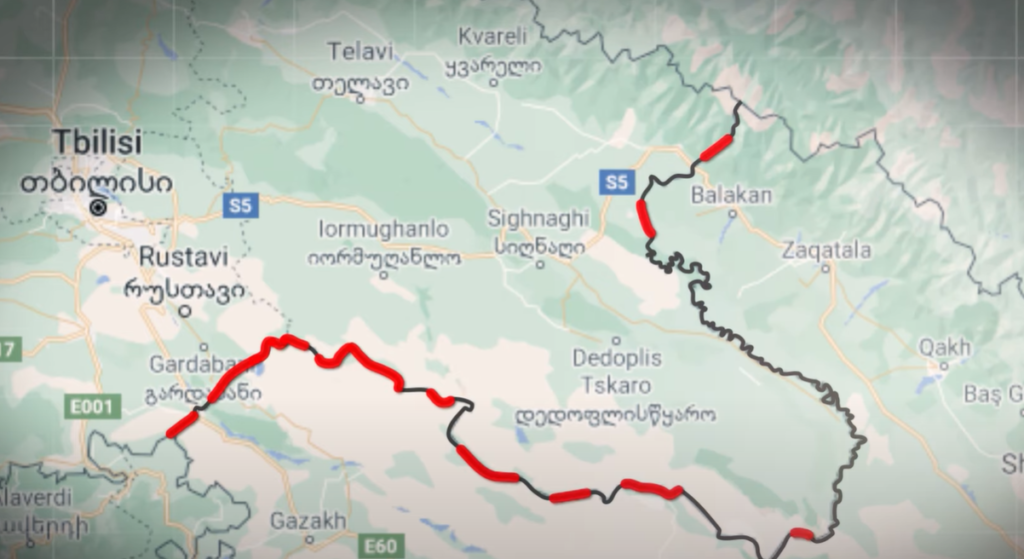Georgian prosecutors have arrested two officials they accuse of hiding a map during border negotiations with Azerbaijan over a decade ago.
The two former members of the state border delimitation commission were charged on Wednesday with ‘violation of territorial integrity’ in 2006–2007.
The charges — coming just 24 days before Georgia’s parliamentary elections and amidst a war between Armenia and Azerbaijan — concern the Davit Gareja Monastery complex on the Georgian–Azerbaijani border.
Azerbaijanis call part of the area Keshikchidagh and consider it to be a site of their own cultural heritage while Georgians have claimed that the Christian monasteries currently under Azerbaijani control are a part of an old Orthodox site.
The Georgian Chief Prosecutor’s Office claimed that Iveri Melashvili, then the head of the experts’ group within the Commission and Natalia Ilichova, their cartographic expert, ‘hid’ original 1:200,000 scale maps printed in 1937–1938. Investigators claimed to have recently retrieved the maps from Ilicheva’s office.
According to the investigation, the two withheld the original maps in order to claim that a copy that the Georgian commission was using could not be authenticated to be used as a source.
According to the prosecution, this led the Georgian Commission to use 1:000,000 and 1:50,000 scale maps issued in the 1970s–1980s instead.
The authorities said this resulted in a ‘historically and legally’ inaccurate position of the Georgian side, including forfeiting 2.7 square kilometres of the Davit Gareji Monastery Complex.
The discrepancy between the ‘accurate’ 1:200,000 scale maps from 1937–1938 and several sections of the Georgian-Azerbaijani border agreed until 2008 based on older maps resulted in Georgia ‘risking losing’ 35 square kilometres, the Cheif Prosecutor's Office claimed.
Over 7% of land ‘given away’ involves Davit Gareja
The two officials indicted on Wednesday have been working in state institutions for years.
Iveri Melashvili is the head of State Border Delimitation, Demarcation, and Border Relations Service at Georgia's Foreign Ministry, while Natalia Ilichova works as a Chief Inspector at the Land Border Defence Department of the Georgian Border Police.
The work of the two officials within the Georgian border delimitation commission in the 2000s was also connected with the issue of the Davit Gareja Monastery Complex that sits across the disputed section of the Georgian-Azerbaijani border.
On 3 September, Melashvili claimed that Georgian and Azerbaijani border commissions had managed to agree on 66% of the common border, excluding, according to him, the land around Davit Gareja.
Ownership of this area became a highly contested issue between Georgia and Azerbaijan in recent years.
The dispute reemerged last spring after Azerbaijani border guards restricted Georgians from accessing some of the monasteries of the Complex, something that caused discontent among clerical leadership and nationalist groups.
Since last year, the Georgian government has assured the public they were working with their Azerbaijani counterparts within the joint commission to solve the issue based on scientific and historical evidence and ‘without politicisation’ of the matter.
However, the Georgian public learnt only on 29 September that the Chief Prosecutor’s Office was probing the Davit Gareja-related work of the Government Commission on Delimitation and Demarcation of State Borders during 2006-2007.
Melashvili and Ilichova were two out of 10 members of the Commission that former Georgian President Mikheil Saakashvili formed in 2006.
The announcement’s timing a month before parliamentary elections has raised concerns among government critics that the authorities could be pursuing a politically motivated prosecution. The Georgian Orthodox Church, meanwhile, has overwhelmingly welcomed the news.




 7 October 2020
7 October 2020



